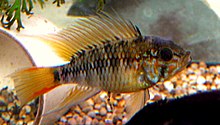Apistogramma macmasteri: Difference between revisions
No edit summary |
Citation bot (talk | contribs) Removed parameters. | Use this bot. Report bugs. | #UCB_CommandLine |
||
| (13 intermediate revisions by 11 users not shown) | |||
| Line 1: | Line 1: | ||
{{Short description|Species of fish}} |
|||
{{Taxobox |
|||
{{Speciesbox |
|||
| image =Macmast.jpg |
| image =Macmast.jpg |
||
| ⚫ | |||
| regnum = [[Animal]]ia |
|||
| ⚫ | |||
| phylum = [[Chordata]] |
|||
| classis = [[Actinopterygii]] |
|||
| ordo = [[Perciformes]] |
|||
| familia = [[Cichlidae]] |
|||
| subfamilia = [[Geophaginae]] |
|||
| genus = ''[[Apistogramma]]'' |
|||
| species = '''''A. macmasteri''''' |
|||
| ⚫ | |||
| ⚫ | |||
}} |
}} |
||
'''''Apistogramma macmasteri''''' is a [[dwarf cichlid]] in the subfamily [[Geophaginae]]. It is a [[benthopelagic]] [[freshwater fish]] that lives in the [[Meta River]] and the [[Orinoco River]] in [[Colombia]]. They grow up to {{convert|7|cm|in}} in [[Fish measurement|total length]].<ref name="fishbase" /> |
|||
'''''Apistogramma macmasteri''''' is a [[dwarf cichlid]] in the [[Tribe (biology)|tribe]] [[Geophagini]], one of the tribes of the [[subfamily]] of American [[cichlid]]s, the [[Cichlinae]].<ref name = Smith>{{cite journal | author1 = Wm. Leo Smith | author2 = Prosanta Chakrabarty | author3 = John S. Sparks | year=2008 | title = Phylogeny, taxonomy, and evolution of Neotropical cichlids (Teleostei: Cichlidae: Cichlinae) | url = http://static1.squarespace.com/enwiki/static/54a3679de4b0d88dbda40971/t/54a3aa48e4b01142025f09fc/1420012104511/20_SmithetalCichlinae.pdf | journal = Cladistics | volume = 24 | issue = 5 | pages = 624–641}}</ref> It is a [[freshwater fish]] that lives in the rivers [[Guatiquía River|Guaytiquía]] and Metica in the [[Meta River]] system. The Meta river system is a part of the [[Orinoco]] basin in [[Colombia]]. They live in areas with soft sandy bottom and plenty of dead roots and branches in the water.<ref>{{Cite web |last=Berg |first=William |date=7 June 2022 |title=Apistogramma macmasteri {{!}} Care & Breeding {{!}} Dwarf Cichlids |url=https://www.dwarfcichlids.com/apistogramma-macmasteri |website=Dwarfcichlids.com}}</ref> Plants are uncommon in areas where ''Apistogramma macmasteri'' is found. |
|||
| ⚫ | |||
They grow up to {{convert|7|cm|in}} in [[Fish measurement|total length]].<ref name="fishbase" /> |
|||
| ⚫ | |||
The [[Species description|author]], [[Sven O. Kullander]] honoured the cichlid [[Fishkeeping|aquarist]] Mark McMaster with the [[Specific name (zoology)|specific name]] of this species. McMaster had pointed this species out to Kullander in 1973, when only aquarium specimens were available.<ref name = ETYFish>{{cite web | url = http://www.etyfish.org/cichlidae6/ | title = Order CICHLIFORMES: Family CICHLIDAE: Subfamily CICHLINAE (a-c) | accessdate= 18 November 2018 | author1 = Christopher Scharpf | author2 = Kenneth J. Lazara | name-list-style = amp | work = The ETYFish Project Fish Name Etymology Database | publisher = Christopher Scharpf and Kenneth J. Lazara | date = 22 September 2018}}</ref> |
|||
==Breeding== |
==Breeding== |
||
The female places her eggs inside the roof of a cavity or underneath a leaf. She takes care of the eggs and alone, while the male guards the territory. |
The female places her eggs inside the roof of a cavity or underneath a leaf.<ref name="fishbase" /> She takes care of the eggs and fry alone,<ref name="fishbase" /> while the male guards the territory. |
||
==References== |
==References== |
||
<references> |
<references> |
||
<ref name="fishbase"> |
<ref name="fishbase">{{FishBase | genus = Apistogramma | species = macmasteri | month = October| year = 2017}}</ref> |
||
<ref name="dwarfcichlid">[http://www.dwarfcichlid.com/Apistogramma_macmasteri.php ''Apistogramma macmasteri''] - dwarfcichlid.com</ref> |
<ref name="dwarfcichlid">[http://www.dwarfcichlid.com/Apistogramma_macmasteri.php ''Apistogramma macmasteri''] - dwarfcichlid.com</ref> |
||
</references> |
</references> |
||
{{Taxonbar|from=Q1757185}} |
|||
[[Category:Apistogramma|macmasteri]] |
[[Category:Apistogramma|macmasteri]] |
||
[[Category: |
[[Category:Fish described in 1979]] |
||
[[Category:Taxa named by Sven O. Kullander]] |
|||
{{Cichlidae-stub}} |
{{Cichlidae-stub}} |
||
Latest revision as of 07:47, 27 September 2023
| Apistogramma macmasteri | |
|---|---|

| |
| Scientific classification | |
| Domain: | Eukaryota |
| Kingdom: | Animalia |
| Phylum: | Chordata |
| Class: | Actinopterygii |
| Order: | Cichliformes |
| Family: | Cichlidae |
| Genus: | Apistogramma |
| Species: | A. macmasteri
|
| Binomial name | |
| Apistogramma macmasteri S. O. Kullander, 1979
| |
Apistogramma macmasteri is a dwarf cichlid in the tribe Geophagini, one of the tribes of the subfamily of American cichlids, the Cichlinae.[1] It is a freshwater fish that lives in the rivers Guaytiquía and Metica in the Meta River system. The Meta river system is a part of the Orinoco basin in Colombia. They live in areas with soft sandy bottom and plenty of dead roots and branches in the water.[2] Plants are uncommon in areas where Apistogramma macmasteri is found.
They grow up to 7 centimetres (2.8 in) in total length.[3]
Fish keepers have selectively bred variants with brighter colors than those found in the wild. It is possible that some of these are crossbred with Apistogramma viejita.[4]
The author, Sven O. Kullander honoured the cichlid aquarist Mark McMaster with the specific name of this species. McMaster had pointed this species out to Kullander in 1973, when only aquarium specimens were available.[5]
Breeding
[edit]The female places her eggs inside the roof of a cavity or underneath a leaf.[3] She takes care of the eggs and fry alone,[3] while the male guards the territory.
References
[edit]- ^ Wm. Leo Smith; Prosanta Chakrabarty; John S. Sparks (2008). "Phylogeny, taxonomy, and evolution of Neotropical cichlids (Teleostei: Cichlidae: Cichlinae)" (PDF). Cladistics. 24 (5): 624–641.
- ^ Berg, William (7 June 2022). "Apistogramma macmasteri | Care & Breeding | Dwarf Cichlids". Dwarfcichlids.com.
- ^ a b c Froese, Rainer; Pauly, Daniel (eds.). "Apistogramma macmasteri". FishBase. October 2017 version.
- ^ Apistogramma macmasteri - dwarfcichlid.com
- ^ Christopher Scharpf & Kenneth J. Lazara (22 September 2018). "Order CICHLIFORMES: Family CICHLIDAE: Subfamily CICHLINAE (a-c)". The ETYFish Project Fish Name Etymology Database. Christopher Scharpf and Kenneth J. Lazara. Retrieved 18 November 2018.
